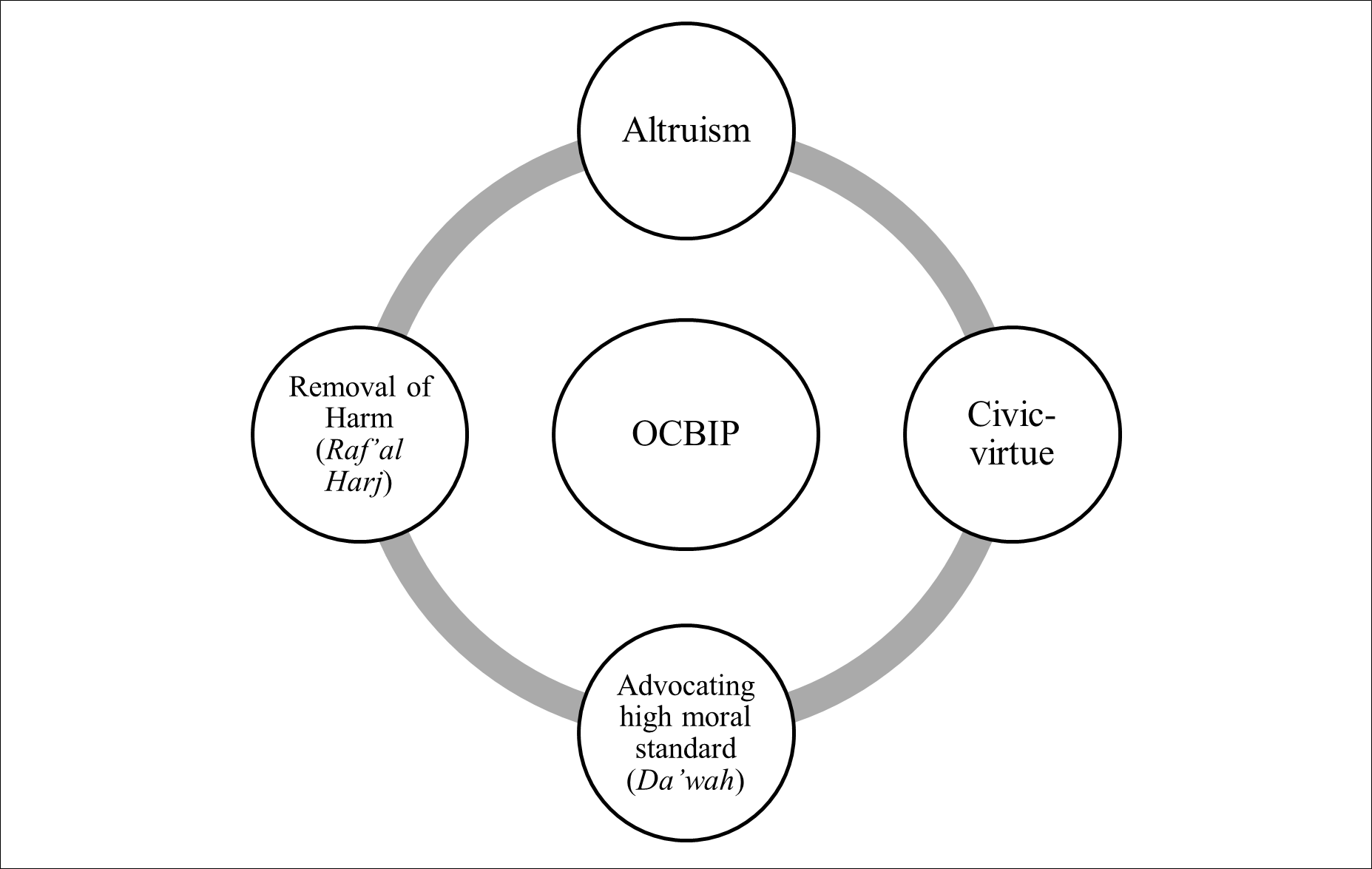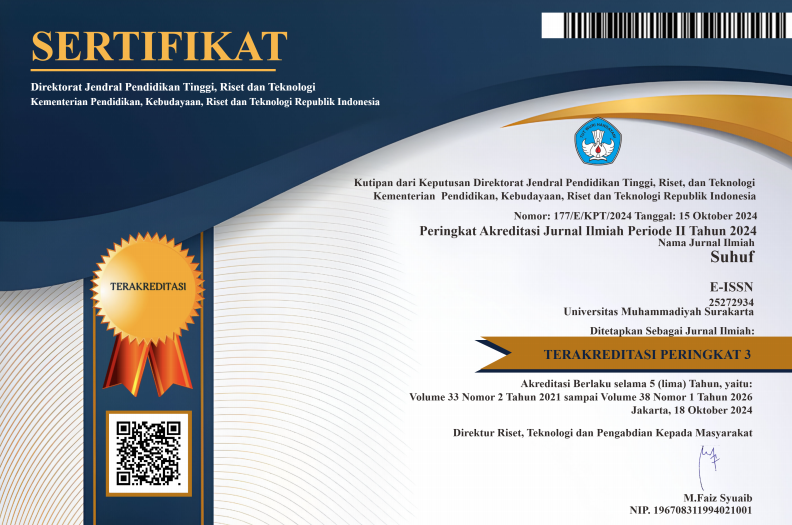Islamic Perspective on Organizational Citizenship Behavior Among Academic Staff in Indonesian State Islamic Higher Education: Is It Effective?
DOI:
https://doi.org/10.23917/suhuf.v36i2.4702Keywords:
Organizational Citizenship Behavior, Academic Staff, Islamic Higher Education Institutions, Descriptive analysis T-testAbstract
This study examines the perceived level of organizational citizenship behavior based on Islamic perspective (OCBIP) practices among academic staff in the Indonesian States' Islamic Higher Education Institutions (ISIHEIs). This study also sought to observe differences in the perceived level of OCBIP among academic staff by gender. A quantitative survey method was employed to collect the data from 450 academic staff of six State Islamic Higher Education Institutions (ISIHEIs) across Indonesia using a five-point OCBIP scale. Descriptive statistics, independent-sample t-tests, and bivariate correlations between antecedents of OCBIP were carried out with SPSS software version 25. The analysis of the study exhibits the perceived level of OCBIP practices among academic staff and gender influences on the perceived variables. The hypothesized model of the study added a new theory and knowledge of OCBIP from the Indonesian State Islamic Higher Education Institutions context that can be used to improve organizational effectiveness in ISIHEIs. The study's findings suggest that the value of the OCBIP practices by academic staff can boost the effectiveness of higher education institutions. The study tested, examined, and formulated OCBIP practices for ISIHEIs. The findings also contribute to understanding how OCBIP could be used to develop organizational effectiveness in the context of ISIHEIs.
Downloads
References
S. E. Jackson, R. S. Schuler, and K. Jiang, "An Aspirational Framework for Strategic Human Resource Management," Acad. Manag. Annu., vol. 8, no. 1, pp. 1–56, 2014, doi: https://doi.org/10.5465/19416520.2014.872335.
B. Caswell, "Leaders Should Learn to Deal with Barriers to Motivation," Canadian HR Reporter. [Online]. Available: https://www.hrreporter.com/news/hr-news/stimulating-lazy-employees/312167
A. Ansong, R. A. Addison, M. A. Yeboah, and L. O. Ansong, "Relational Leadership And Organizational Citizenship Behavior: Do Employee Well-Being And Employee Voice Matter?," Leadersh. Heal. Serv., vol. 37, no. 2, pp. 259–276, 2023, doi: https://doi.org/10.1108/LHS-06-2023-0041.
D. W. Organ, "Organizational Citizenship Behavior: It’s Construct Clean-Up Time," in Organizational Citizenship Behavior and Contextual Performance, vol. 10, no. 2, 2014, pp. 85–97. [Online]. Available: https://books.google.co.id/books?hl=id&lr=&id=O_TpAgAAQBAJ&oi=fnd&pg=PA85&ots=HANcP5MTFq&sig=bWZlxONApfFfScDnCqZupylus3A&redir_esc=y#v=onepage&q&f=false
E. Pugliese, M. Bonaiuto, S. Livi, A. Theodorou, and D. Knippenberg, "Team Identification More Than Organizational Identification Predicts Counterproductive Work Behavior and Organizational Citizenship Behavior and Mediates Influences Of Communication Climate and Perceived External Prestige," J. Appl. Soc. Psychol., vol. 54, no. 2, pp. 116–125, 2024, doi: https://doi.org/10.1111/jasp.13017.
D. W. Organ, Organizational Citizenship Behavior: The Good Soldier Syndrome. Lexington, MA: Lexington Books, 1988.
L. Van Dyne, J. W. Graham, and R. M. Dienesch, "Organizational Citizenship Behavior: Construct Redefinition, Measurement, and Validation," Acad. Manag. J., vol. 37, no. 4, pp. 765–802, 1994, doi: https://journals.aom.org/doi/abs/10.5465/256600.
M. Taamneh, N. Aljawarneh, M. A.-O. Icon, A. Taamneh, and A. Al-Oqaily, "The Impact of Ethical Leadership on Organizational Citizenship Behavior in Higher Education: the Contingent Role of Organizational Justice," Cogent Bus. Manag., vol. 11, no. 1, p. 2294834, 2024, doi: https://doi.org/10.1080/23311975.2023.2294834.
D. Abbasi, "Factors Affecting Job Commitment In Faculty Of Zanjan University." Tehran, 1998.
A. Gholipour and S. A. Sadat, "The Relationship Of Organizational Climate And Job Stress And Its Impacts On Teachers Of High Schools," Commer. Strateg., vol. 1, no. 8, pp. 55–64, 2008, [Online]. Available: https://scholar.google.com/citations?view_op=view_citation&hl=id&user=1980mwgAAAAJ&cstart=600&pagesize=100&sortby=pubdate&citation_for_view=1980mwgAAAAJ:7Frjd3zlGBUC
H. Halid, D. M. H. Kee, and N. F. A. Rahim, "Perceived Human Resource Management Practices and Intention to Stay in Private Higher Education Institutions in Malaysia: The Role of Organizational Citizenship Behaviour," Glob. Bus. Rev., vol. 25, no. 1, pp. 162–179, 2024, doi: https://doi.org/10.1177/0972150920950906.
H. Z. Matin, G. Jandaghi, and F. Ahmadi, "Introducing a Comprehensive Model Of Factors Impacting on Developing Organizational Citizenship Behaviour; Case Study: Employees of National Oil Industry of Iran," Public Manag., vol. 4, no. 10, pp. 1932–1945, 2010, [Online]. Available: https://www.researchgate.net/publication/228435877_A_comprehensive_model_for_identifying_factors_impacting_on_development_of_organizational_citizenship_behavior
L. F. Koning and G. A. Van Kleef, "How Leaders’ Emotional Displays Shape Followers’ Organizational Citizenship Behavior," Leadersh. Q., vol. 26, no. 4, pp. 489–501, 2015, doi: https://doi.org/10.1016/j.leaqua.2015.03.001.
M. V. Romi, E. Ahman, Disman, E. Suryadi, and A. Riswanto, "Islamic Work Ethics-Based Organizational Citizenship Behavior to Improve the Job Satisfaction and Organizational Commitment of Higher Education Lecturers in Indonesia," Int. J. High. Educ., vol. 9, no. 2, pp. 78–84, 2020, [Online]. Available: https://eric.ed.gov/?id=EJ1240542
Munawir, K. Raharjo, M. A. Djalil, H. Syahputra, B. Muslim, and M. Adam, "Dimensions of Identity Strength and Organizational Citizenship Behavior (OCB) in Establishing Good University Governance and Performance of Religious Ideology-Based Higher Educations," J. Appl. Res. High. Educ., vol. 11, no. 2, pp. 250–272, 2019, doi: https://doi.org/10.1108/JARHE-07-2018-0115.
Y. Shin, M. S. Kim, J. N. Choi, M. Kim, and W. K. Oh, "Does Leader-Follower Regulatory Fit Matter? The Role Of Regulatory Fit In Followers’ Organizational Citizenship Behavior," J. Manage., vol. 43, no. 4, pp. 1211–1233, 2017, doi: 10.1177/0149206314546867.
R. Takeuchi, M. Bolino C., and C.-C. Lin, "Too Many Motives? The Interactive Effects of Multiple Motives on Organizational Citizenship Behavior," J. Appl. Psychol., vol. 100, no. 4, pp. 1239–1248, 2015, doi: https://psycnet.apa.org/doi/10.1037/apl0000001.
J. S. Hasibuan, Jufrizen, A. S. Sari Nasution, and M. Sari, "Organizational Citizenship Behavior as A Moderator in Employee Performance: A Study on Emotional Intelligence and Job Satisfaction," Int. J. Sustain. Dev. Plan., vol. 19, no. 1, p. 365, 2014, doi: https://doi.org/10.18280/ijsdp.190135.
B. Delgoshaie, S. Tofighi, and B. Kermani, "The Relationship Of Organizational Climate And Organizational Commitment Employees And Managers Of Training Hospitals Of Hamadan University Of Medical Sciences," Ofoghdanesh, vol. 14, no. 4, pp. 60–68, 2008, doi: http://imtj.gmu.ac.ir/article-1-481-en.html.
D. W. Organ, P. M. Podsakoff, and S. B. MacKenzie, Organizational Citizenship Behavior: Its Nature, Antecedents, and Consequences. Thousand Oaks, CA: Sage Publications, 2006.
P. M. Podsakoff, S. B. MacKenzie, J. B. Paine, and D. G. Bachrach, "Organizational Citizenship Behaviors: A Critical Review of the Theoretical and Empirical Literature and Suggestions for Future Research," J. Manage., vol. 26, no. 3, pp. 513–563, 2000, doi: https://doi.org/10.1177/014920630002600307.
S. Appelbaum et al., "Organizational Citizenship Behavior: A Case Study of Culture, Leadership and Trust," Manag. Decis., vol. 42, no. 1, pp. 13–40, 2004, doi: https://doi.org/10.1108/00251740410504412.
M. L. Lengnick-Hall, C. A. Lengnick-Hall, L. S. Andrade, and B. Drake, "Strategic Human Resource Management: The Evolution Of The Field," Hum. Resour. Manag. Rev., vol. 19, no. 2, pp. 64–85, 2009, doi: https://doi.org/10.1016/j.hrmr.2009.01.002.
H. Yao and M. Yu, "An Empirical Study on Organizational Citizenship Behavior and Business Performance," in Proceedings of the 7th International Conference on Innovation & Management, 2011, pp. 1462–1466. [Online]. Available: https://www.semanticscholar.org/paper/An-Empirical-Study-on-Organizational-Citizenship-Yao-Yu/8ea56c44bc6e0631c544aff0d4bf54306831edef
B. J. Allison, R. S. Voss, and S. Dryer, "Student Classroom And Career Success: The Role Of Organizational Citizenship Behavior," J. Educ. Bus., vol. 76, no. 5, pp. 282–288, 2001, doi: https://doi.org/10.1080/08832320109599650.
M. Russo, L. Guo, and Y. Baruch, "Work Attitudes, Career Success And Health: Evidence From China," J. Vocat. Behav., vol. 84, no. 3, pp. 248–258, 2014, doi: https://doi.org/10.1016/j.jvb.2014.01.009.
S. Rosita, M. Musnaini, and D. M. Fithriani, "Commitment, Satisfaction and Motivation in Improving Organizational Citizenship Behavior and its Impact on Lecturer Performance in Higher Education," in Proceedings of the 5th NA International Conference on Industrial Engineering and Operations Management, Detroit, Michigan, USA: IEOM Society International, 2020, pp. 3771–3782. [Online]. Available: https://ieomsociety.org/detroit2020/proceedings/
K. N. Rao, J. Marigowda, and D. Venugopal, "Workplace Spirituality And Organisational Citizenship Behaviour: An Impact Study," Int. J. Work Organ. Emot., vol. 15, no. 1, pp. 44–60, 2024, doi: https://doi.org/10.1504/IJWOE.2024.136602.
D. Fatihudin, M. A. Firmansyah, and Nur Mukarromah, "How Service Quality Mediates Total Quality Management (TQM), and Organizational Citizenship Behaviour (OCB) Affects the Performance of Private Universities in Indonesia," Int. J. Innov. Creat. Chang., vol. 11, no. 8, pp. 14–23, 2020, [Online]. Available: https://www.ijicc.net/index.php/ijicc-editions/2020/159-vol-11-iss-8
H. E. Puteri and M. Arifin, "Exploring Personality, Grit and Organizational Citizenship Behavior at Higher Education: The Mediating Roles of Job Involvement," J. Phys. Conf. Ser., vol. 1471, no. 1, pp. 1–8, 2020, doi: https://doi.org/10.1088/1742-6596/1471/1/012025.
N. Majeed and S. Jamshed, "Heightening Citizenship Behaviours of Academicians Through Transformational Leadership: Evidence Based Interventions," Qual. Quant., vol. 57, no. Suppl 4, pp. 575–606, 2023, doi: https://doi.org/10.1007/s11135-021-01146-2.
A. R. Sridadi, A. Eliyana, F. A. Priyandini, A. S. Pratama, S. R. Ajija, and N. L. M. Kamil, "Examining Antecedents of Organizational Citizenship Behavior: An Empirical Study in Indonesian Police Context," PLoS One, vol. 18, no. 10, pp. 1–18, 2023, doi: https://doi.org/10.1371/journal.pone.0291815.
N. P. Podsakoff, S. W. Whiting, P. M. Podsakoff, and B. D. Blume, "Individual and Organizational- Level Consequences of Organizational Citizenship Behaviors: A Meta-Analysis," J. Appl. Psychol., vol. 94, no. 1, pp. 122–141, 2009, doi: https://doi.org/10.1037/a0013079.
A. S. Supriyanto and V. M. Ekowati, "Spirituality at Work and Organizational Commitment as Moderating Variables in Relationship between Islamic Spirituality and OCB IP and Influence Toward Employee Performance," J. Islam. Mark., vol. 11, no. 6, pp. 1777–1799, 2019, doi: https://doi.org/10.1108/JIMA-08-2018-0140.
A. Sani and V. M. Ekowati, "Spirituality to Organizational Citizenship Behavior from Islamic Perspective: Mediating Role of Spirituality at Work and Organizational Commitment," J. Islam. Mark., vol. 13, no. 12, pp. 2672–2694, 2022, doi: https://doi.org/10.1108/JIMA-07-2020-0211.
M. Ali, "Pendidikan Karakter Berwawasan Tasawuf [Character Education with a Sufi Perspective]," Suhuf, vol. 31, no. 1, pp. 1–12, (In Indonesian), 2019, doi: https://doi.org/10.23917/suhuf.v31i1.9002.
I. Taymiyah and A. bin A. Halim, Al-Iman al’wasat (The mid of faith). Al-Gazair: al-. Shrikh al-Gazairiyah al-Libinaniyyah, 2006.
L. J. Williams and S. E. Anderson, "Job Satisfaction and Organizational Commitment as Predictors of Organizational Citizenship and in-Role Behaviors," J. Manage., vol. 17, no. 3, pp. 601–617, 1991, doi: https://doi.org/10.1177/014920639101700305.
J. Hashim, "Islamic Revival in Human Resource Management Practices Among Selected Islamic Organisations in Malaysia," Int. J. Islam. Middle East. Financ. Manag., vol. 2, no. 3, pp. 251–267, 2009, doi: https://doi.org/10.1108/17538390910986362.
M. K. Metle, "The Influence of Traditional Culture on Attitudes Towards Work Among Kuwaiti Women Employees in the Public Sector," Women Manag. Rev., vol. 17, no. 6, pp. 245–61, 2002, doi: https://doi.org/10.1108/09649420210441905.
M. H. Fard, A. A. Damavandi, A. Mahdilouytazehkandi, and M. Asharin, "Leadership and Followers’ Organizational Citizenship Behaviour from the Islamic Perspective (OCBIP)," J. Islam. Mark., vol. 12, no. 6, pp. 1124–1144, 2021, doi: https://doi.org/10.1108/JIMA-02-2019-0036.
R. J. Cohen, M. E. Swerdlik, and S. M. Phillips, Psychological Testing and Assessment: An Introduction to Tests and Measurement, 3rd ed. California: Mayfield Publishing Co, 1996.
M. Kamil and K. Ahmad, "Development of a Scale for Measuring the Construct of Organizational Citizenship Behaviour from the Islamic Perspective," Malaysian Manag. Rev., vol. 49, no. 1, pp. 55–66, 2014, [Online]. Available: https://papers.ssrn.com/sol3/papers.cfm?abstract_id=2542074
E. Soltani, R. van der Meer, T. M. Williams, and P. Lai, "The Compatibility of Performance Appraisal Systems with TQM Principles–Evidence from Current Practice," Int. J. Oper. Prod. Manag., vol. 26, no. 1, pp. 92–112, 2006, doi: https://doi.org/10.1108/01443570610637030.
H. B. M. Ali and I. B. Zulkipli, "Validating a Model of Strategic Leadership Practices for Malaysian Vocational College Educational Leaders: A Structural Equation Modeling Approach," Eur. J. Train. Dev., vol. 43, no. 1/2, pp. 21–38, 2019, doi: https://doi.org/10.1108/EJTD-03-2017-0022.
H. B. M. Ali, M. W. Shohib, and M. B. Bin Ibrahim, "Validating a Model of OCBIP Practices in Indonesian Islamic Higher Education Institutions: A structural Equation Modeling Approach," IIUM J. Educ. Stud., vol. 9, no. 2, pp. 64–88, 2021, doi: https://doi.org/10.31436/ijes.v9i2.317.
E. L. Vockell and J. W. Asher, Educational Research, 2nd ed. Englewood Cliffs, NJ: Prentice Hall, 1998.
B. Johnson and L. Christiensen, Educational Research: Qualitative, Quantitative, and Mixed Approaches, no. 4. New York, NY: Sage, 2012.
U. Sekaran and R. Bougie, Research Methods for Business: A Skill Building Approach. West Sussex: John Wiley & Sons Ltd, 2016.

Downloads
Submitted
Accepted
Published
How to Cite
Issue
Section
License
Copyright (c) 2024 Muhammad Wildan Shohib, Mohammad Zakki Azani, Nurul Lathifatul Inayati, Dartim, Ahmad Nubail

This work is licensed under a Creative Commons Attribution 4.0 International License.


















